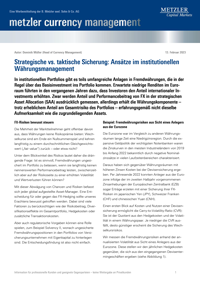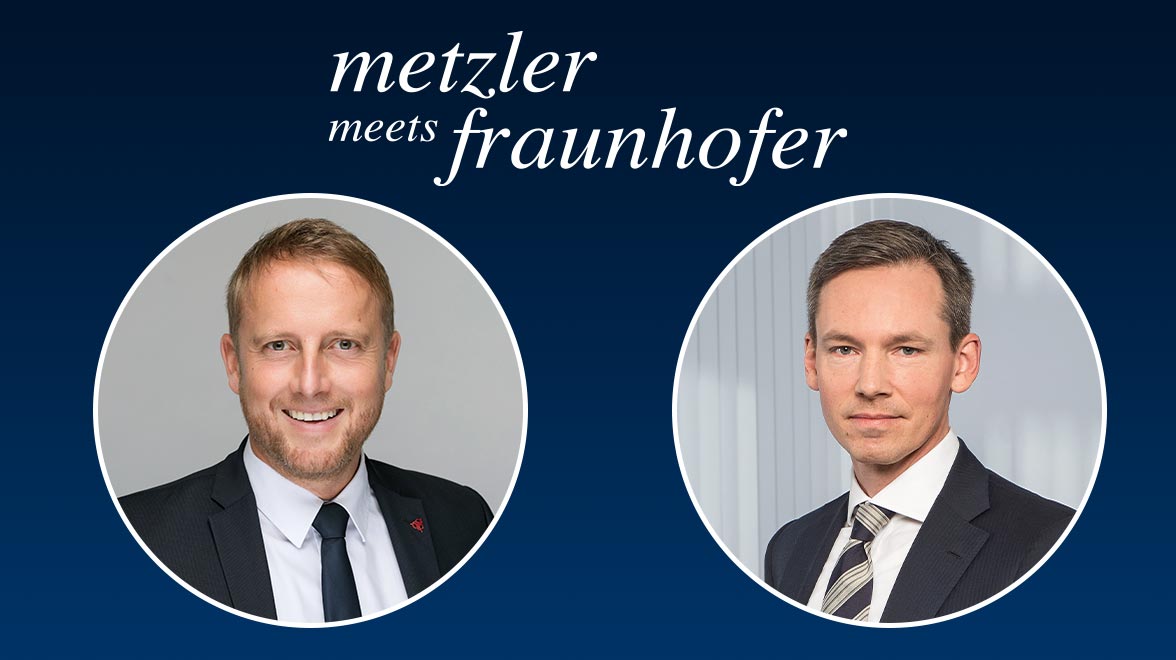Strategische vs. taktische Sicherung: Ansätze im institutionellen Währungsmanagement
The article is not available in the chosen language und will therefore be displayed in the default language.
In institutionellen Portfolios gibt es teils umfangreiche Anlagen in Fremdwährungen, die in der Regel über das Basisinvestment ins Portfolio kommen. Erwartete niedrige Renditen im Euroraum führten in den vergangenen Jahren dazu, dass Investoren den Anteil internationaler Investments erhöhten. Zwar werden Anteil und Performancebeitrag von FX in der strategischen Asset Allocation (SAA) ausdrücklich gemessen, allerdings erhält die Währungskomponente – trotz erheblichem Anteil am Gesamtrisiko des Portfolios – erfahrungsgemäß nicht dieselbe Aufmerksamkeit wie die zugrundeliegenden Assets.

FX-Risiken bewusst steuern
Die Mehrheit der Marktteilnehmer geht offenbar davon aus, dass Währungen keine Risikoprämie bieten: Wechselkurse sind am Ende ein Nullsummenspiel und kehren langfristig zu einem durchschnittlichen Gleichgewichtswert („fair value“) zurück – oder etwa nicht?
Unter dem Blickwinkel des Risikos lautet daher die drängende Frage: Ist es sinnvoll, Fremdwährungen ungesichert im Portfolio zu belassen, wenn sie langfristig keinen nennenswerten Performancebeitrag leisten, zwischenzeitlich aber auf der Risikoseite zu einer erhöhten Volatilität und Wertverlusten führen können?
Mit dieser Abwägung von Chancen und Risiken befasst sich jeder global aufgestellte Asset-Manager. Eine Entscheidung für oder gegen das FX-Hedging sollte unseres Erachtens bewusst getroffen werden. Dabei sind viele Faktoren zu berücksichtigen wie der Risikobeitrag, Diversifikationseffekte im Gesamtportfolio, Hedgekosten oder zusätzliche Transaktionskosten.
Aber auch regulatorische Vorgaben können eine Rolle spielen, zum Beispiel Solvency II, wonach ungesicherte Fremdwährungspositionen in den Portfolios von Versicherungsunternehmen mit Eigenkapital zu hinterlegen sind. Die Entscheidungsfindung ist also nicht einfach.
Beispiel: Fremdwährungsrisiken aus Sicht eines Anlegers aus der Eurozone
Die Eurozone war im Vergleich zu anderen Währungsräumen lange Zeit eine Niedrigzinsregion. Durch die expansive Geldpolitik der wichtigsten Notenbanken waren die Zinskurven in den meisten Industrieländern von 2019 bis Anfang 2022 bekanntlich durch negative Nominalzinssätze in vielen Laufzeitenbereichen charakterisiert.
Daraus haben sich gegenüber Währungsräumen mit höheren Zinsen Kosten bei der Devisensicherung ergeben. Per Jahresende 2022 konnten Anleger aus der Eurozone infolge der im zweiten Halbjahr vorgenommenen Zinsanhebungen der Europäischen Zentralbank (EZB) sogar Erträge erzielen mit einer Sicherung ihrer FX-Risiken im japanischen Yen (JPY), Schweizer Franken (CHF) und chinesischen Yuan (CNH)...
Der Fachbeitrag hat Ihr Interesse geweckt?
More articles
This electronic communication, including any attachments hereto (together, the “Communication”), constitutes marketing material published by B. Metzler seel. Sohn & Co. AG (“Metzler”).
This Communication is confidential and intended solely for the addressee. If you are not the intended recipient, please advise us immediately and delete it. This Communication is provided for information purposes only and may not be duplicated, redistributed, forwarded to third parties or otherwise published. This Communication is not intended for distribution to, or use by any person or entity in any jurisdiction or country where such distribution or use would be contrary to local law or regulation. This Communication is addressed exclusively to eligible counterparties and professional clients. It is thus not suitable for retail clients.
This Communication is based on information which is generally available and which Metzler believes to be fundamentally reliable. Metzler has not verified the accuracy or completeness of the information, however, and thus provides no warranty or representation in respect of the accuracy or completeness of the information, opinions, estimates, recommendations and forecasts contained in this Communication. Neither Metzler nor any of its shareholders or employees may be held liable for damages or any other disadvantage suffered due to inaccurate or incomplete information, opinions, estimates, recommendations or forecasts resulting from the distribution or use of this Communication or in connection with this Communication in any way.
This Communication does not constitute or form part of any offer or solicitation of any offer to buy securities, other financial instruments or other investment instruments. This Communication does not meet the legal requirements for ensuring impartiality of investment recommendations pursuant to Section 85 of the German Securities Trading Act (WpHG) in conjunction with Section 20 (1) of Regulation (EU) No. 596/2014 of the European Parliament and of the Council of April 16, 2014 regarding market abuse (Market Abuse Regulation) to which Articles 4 and 6 of the Delegated Regulation (EU) 2016/958 of the Commission of March 9, 2016 apply in addition to the Market Abuse Regulation. This Communication does not take account of the particular investment objectives, financial situation or needs of individual recipients nor does it constitute personal investment advice. Metzler does not act as investment advisor or portfolio manager in preparing and submitting this Communication. Recipients must make their own investment decisions in accordance with their specific financial situation and investment objectives, based on independent processes and analyses, taking sales or other prospectuses, information memoranda and other investor information into account, and consult with an independent financial advisor where necessary. Recipients should note that any information regarding past performance should not be relied upon as an indication of future performance and should therefore not form the basis of any decision whether or not to invest in any financial instruments.
The information, opinions, estimates, recommendations and forecasts contained in this Communication reflect the personal views of the author/sender at the time of publication on the financial instruments or issuers that form the subject of this Communication and do not necessarily reflect the opinions of Metzler (including any research publications compiled by Metzler relating to the financial instruments or issuers discussed in this Communication), the issuer or third parties. They may also be subject to change on account of future events and developments. Metzler has no obligation to amend, supplement or update this Communication or to otherwise notify recipients in the event that any information, opinions, estimates, recommendations or forecasts stated herein should change or subsequently become inaccurate, incomplete or misleading. The model calculations contained in this Communication, if any, are examples showing the possible performance and are based on various assumptions (e.g. regarding earnings and volatility). The actual performance may be higher or lower, depending on market trends and on the correctness of assumptions underlying the model calculations. Accordingly, actual performance cannot be guaranteed, warranted or assured.
Recipients should assume that (a) Metzler is entitled to acquire orders for investment banking, securities or other services from or with companies that form the subject of research publications and that (b) analysts who were involved in preparing research publications may, within the scope of regulatory laws, be indirectly involved in the acquisition of such orders.
Metzler and its employees may hold positions in securities of the companies analysed or in other investment objects or may conduct transactions with such securities or investment objects (please also see the information on potential conflicts of interest applicable to Metzler and its affiliates that is available on our website).
Metzler reserves all copyrights and rights of use, including those relating to electronic media.
Metzler cannot provide absolute assurances that all of Metzler’s electronic communications (sent or received) are secure, error free, not corrupted, complete or virus free and/or that they will not be lost, mis-delivered, destroyed, delayed or intercepted/decrypted by others. Therefore, Metzler, to the extent permitted under applicable law, disclaims all liability with regards to electronic communications (and the contents therein) if they are corrupted, lost destroyed, delayed, incomplete, mis-delivered, intercepted, decrypted or otherwise misappropriated by others. Insofar as Metzler provides hyperlinks to any third party websites, this does not mean that Metzler confirms, recommends or warrants any data contained on the linked sites or data which can be accessed from such sites. Metzler accepts no liability for links or data, nor for any consequences which may arise as a result of following the links and/or using the data.
This Communication is subject to the laws of the Federal Republic of Germany. Venue of jurisdiction for any disputes shall be Frankfurt am Main, Germany.
 Deutsch
Deutsch English
English



